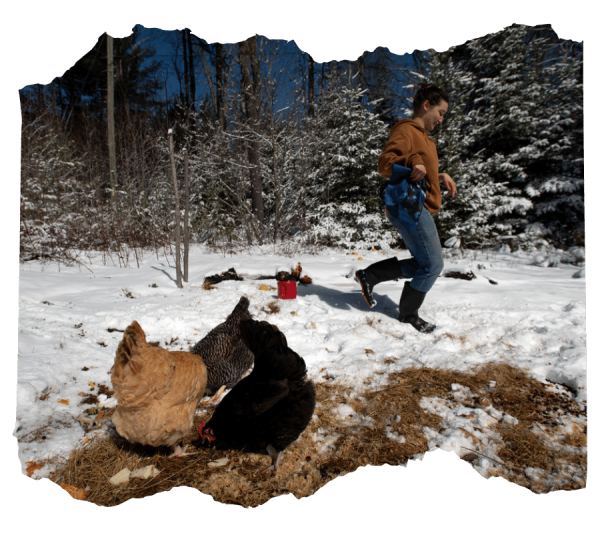They moved to Maine during the pandemic to pursue their homesteading dreams
When Arianna Lavan and her husband started looking for places to homestead, Maine was not on their list. But after just a year on their small farm outside of Lincoln, they could not be happier to have ended up here.
“We had spent a couple of years saving up our money and researching different places,” Lavan said. “We wanted a state that had the laws and philosophy we were looking for [and] we were looking more at Wyoming, New Hampshire and Vermont.”
They wanted a state that allowed open carry of guns and the opportunity to legally grow marijuana and raise animals, and that had an unintrusive state government.
“When we looked at Maine, we saw all that with the unorganized territories,” Lavan said. “Then we started looking at property costs and said, ‘This is the place.’”
The only way they could swing the move during the pandemic was by selling property they already owned in a different state, dipping heavily into their savings and holding down jobs as they grow their homestead in Maine. It allowed them to purchase their land outright.

Lavan, 27, and her husband, 29, bought their home on 5.69 acres in Burlington in October 2021 for $60,000 after selling what Lavan describes as a three-bedroom on a postage stamp in Delaware for $95,000. The sale left them with enough money to fund their move last May.
In Delaware, Lavan worked in sales and her husband installed building sprinkler systems.
“We lived in an investment property and saved and saved our money,” Lavan said. “When we had the cash, we moved.”
They now have a small flock of chickens, two meat rabbits for breeding and a pregnant Nubian goat. Just less than an acre is devoted to a vegetable garden.
“We thought we had gotten an amazing deal, especially with how quickly the market was moving,” she said. “But as we listened to our very established neighbors we realized we had paid that ‘out of stater, get them while we can’ price,’ but for us, it was very affordable.”
Paying for the homestead drained their accounts, leaving them little money once they arrived in Maine. So they looked for work.
“When we got here in Maine, we had sold one of our cars,” Lavan said. “So I figured I’d look for work I could walk or bicycle to.”
Her first thought was to see if anyone wanted to hire her to clean their homes or help with chores.
“I quickly realized that the socio-economics of the area were like mine,” Lavan said. “I could not afford to hire a housekeeper and neither could they.”
But Lavan soon got hired for several days harvesting hay, a job often described as one of the toughest in the state.
The hay harvest typically takes place during the hottest days of the summer. On the smaller farms like the one Lavan found herself, it means walking through fields and tossing 50- to 80-pound bales onto trailers and then offloading them into storage lofts.
“People here value hard work,” Lavan said. “If you show up and you do the work, you are welcome with open arms.”
That one hay job led to another. From there Lavan secured a part-time job at the local hardware store. She’s also helping a neighbor by doing chores in exchange for fresh milk and eggs.
Lavan does not see how anyone could live a homesteading life in Maine without some sort of outside income and cash to get started.
“I’m not saying it’s impossible to do it without operating capital,” she said. “But even my neighbor who sells goat cheese she makes from milking her own goats has to spend money to buy the containers she sells the cheese in.”
That, she said, can make it hard to turn a profit off your homestead.
At the same time, she said it was not difficult to create a homestead and lifestyle they are confident could withstand a breakdown in the economy, another pandemic or worse.
“We wanted more control over how we live,” she said. “We can hunt, we have a wood stove and we have installed a [pump] so we can draw water. If the grid goes down we can survive.”
Lavan said she grew up in a rural area in Pennsylvania homeschooled by her parents and helped them in their garden.
“I knew I wanted to get back into that life,” she said. “I just figured I would be 60 or 70 when it happened.”

When she met her husband, they realized the older they got the harder it would be to achieve those goals.
“We realized it could not be a retirement thing,” Lavan said. “It had to be a lifestyle thing.”
In Burlington, they found a mix of people from families who have lived in the area for generations and newcomers like themselves.
“We expected to find some like-minded people,” she said. “One thing we did not expect was an entire community of like-minded people.”
Connecting on a personal level with those people has been a bit of a challenge for her husband, who grew up in a more urban environment, Lavan said.
“I think now he is learning how essential that is here because you can’t do it on your own, especially if something bad happens,” Lavan said.
So far neighbors have stepped up — often without being asked — to plow snow out of their driveways and clear downed trees from their property.
“I am so grateful to be here,” Lavan said. “We have zero buyer’s remorse.”
